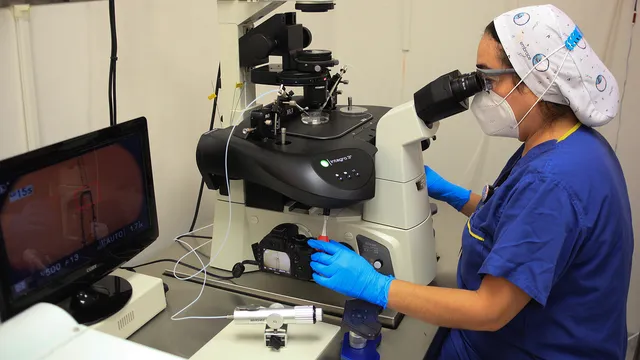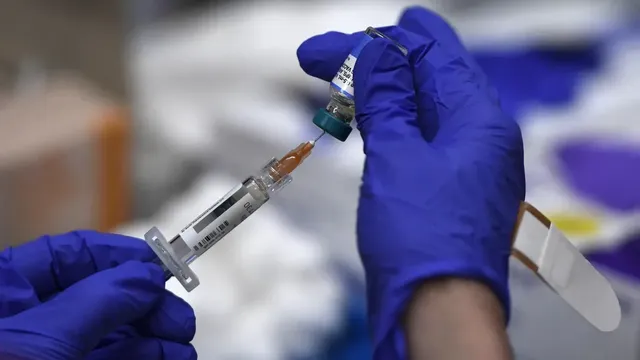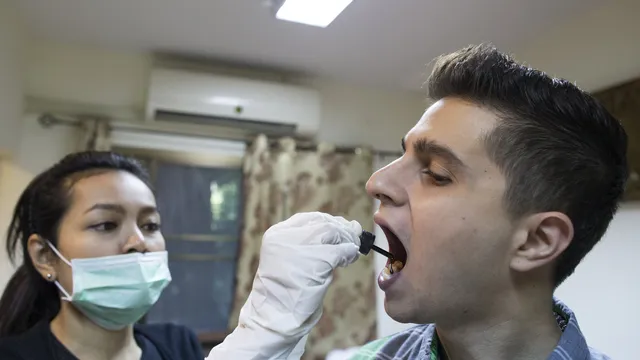EU-funded researchers are working to reduce the health risks associated with Down syndrome and improve long-term quality of life.
David Clarke has a busy life combining two jobs. He works three days a week recycling waste in a supermarket in Drogheda, his home town in the East of Ireland. On other days he travels an hour by bus to the capital Dublin to work in a gift basket warehouse. At the age of 44 and with Down's syndrome, David is thriving.
"He still lives at home with me and his mother, but leads a pretty independent life," says his father Pat Clark, who volunteers on the board of the European Down Syndrome Association (EDSA), a non-profit organisation that supports and represents people with Down syndrome across Europe.
In recent decades, the life and work prospects of people with the condition have improved significantly thanks to medical advances and EDSA's advocacy.
"When David was born in 1981, the average life expectancy for people with Down syndrome in Ireland was only around 20 years," says Clarke. "Now it's 60-70 years."
But there's still plenty of room for improvement. Although David Clark's current situation is positive, many challenges remain for people living with Down syndrome.
With longer life expectancy comes an increased risk of Down syndrome-related health conditions, including early-onset Alzheimer's disease and a greater risk of obesity. The condition can also lead to lifelong developmental delays, cognitive impairment and severe health problems, including heart and digestive problems.
Dr. Yann Heraud, a geneticist and neurobiologist at the Institute of Genetics, Molecular and Cell Biology in Strasbourg, France, is leading a five-year EU-funded research initiative called GO-DS21 that is working to better understand the unique health risks of people with Down syndrome and how to manage them.
"Until now, we weren't aware of exactly when and how many of these comorbidities occur in the lifetime of people with Down syndrome, nor how they are interrelated," says Hero. "We need to know this to understand the syndrome as a whole."
The GO-DS21 team brings together clinicians, pathophysiologists, integrative bioinformaticians and computer artificial intelligence specialists from France, Germany, the Netherlands, Spain and the United Kingdom.
Together, they are exploring the full spectrum of health issues faced by people with Down syndrome, focusing in particular on obesity, diabetes and intellectual disability.
For example, their research found that the risk of diabetes in people with Down syndrome is four times that of the general population in those aged 5 to 24 years and twice as high in those aged 25 to 44 years. However, diabetes does not appear to be a significant factor in the development of obesity in people with Down syndrome - suggesting that other biological and genetic factors may play a role.
The research team also found a higher risk of dementia, hypothyroidism, epilepsy and leukaemia, but lower rates of asthma, some cancers, coronary heart disease and high blood pressure.
Their work will help to build a clearer picture of the specific health profile of people with Down syndrome, including the genetic and environmental factors that contribute to the different diseases they experience.
By understanding the biological pathways and mechanisms that link Down syndrome to various conditions, researchers hope to be able to offer more effective treatments and health advice that could help improve overall quality of life.
The research is particularly important as the condition is apparently becoming more prevalent, with cases of Down's increasing from approximately 16 per 10,000 births in 1990 to 23 in 2015, according to data from the European Commission's central JRC-EUROCAT registry.
"The idea is to give families evidence-based recommendations on things they can do to minimize the health risks for people with Down syndrome," says Hero.
To that end, the researchers hold regular meetings with patient organizations like EDSA to share results and get feedback. This contributes to the EU's goal of making independent living a reality for people with disabilities by empowering them to choose how, where and with whom they live.
As the team learns more about the factors affecting the health of people with Down syndrome, it is making lifestyle recommendations related to diet and exercise that it believes can make a big difference.
The research team has also launched a major survey to coincide with World Down Syndrome Day on 21 March, with the aim of gathering information from families to help further their research and ultimately improve the lives of people with Down syndrome.
In terms of treatment, another EU-funded research team led by Dr Rafael de la Torre, a neurologist at the Hospital del Mar Research Institute in Barcelona, Spain, is making promising progress in developing a pharmacological solution to improve cognitive impairment in people with Down syndrome.
As part of a five-year international research effort called ICOD, Aelis Pharma, a biotechnology company in Bordeaux, France, is working on an experimental drug called AEF0217 that targets a part of the brain that plays a role in memory and learning - the CB1 receptor.
This receptor is prone to excessive activity in people with Down syndrome, which is thought to contribute to cognitive impairment. AEF0217 acts as a selective CB1 inhibitor, reducing this overactivity without completely blocking the receptor.
Potential benefits for people with Down syndrome include improved cognitive abilities, particularly in the areas of learning and memory, and greater independence in daily life due to improvements in focus and problem solving.
AEF0217 is currently in clinical trials, with early results showing promise. If successful, it could be the first approved treatment to improve cognitive function in people with Down syndrome.
"For the first time, we have in our hands a treatment with the potential to really improve intellectual disability in people with Down syndrome," says de la Torre. "This will help them integrate better into society and have better job opportunities."
A big step was taken in the initial one-month trial in 2024, which appeared to show both the drug's safety and its potential effectiveness.
Among 29 people with Down syndrome aged between 18 and 35 with mild or moderate disabilities, it led to significant improvements in oral and written communication, daily living skills and social interactions. Participants have also shown greater flexibility in adapting to new situations.
"These effects were seen in just four weeks, which is fantastic," says de la Torre. "Typically, with cognitive treatment, one would expect to wait about three to six months to see improvements."
By the end of the five-year ICOD initiative in January 2026, the team will have completed a larger study on about 200 participants in France, Italy and Spain. De la Torre believes the drug could be ready for use in about three years if accelerated.
As well as having the potential to improve the lives of people with Down's syndrome, such a treatment could also significantly reduce parental stress, he says. "Having a treatment would change everything." | BGNES

 Breaking news
Breaking news
 Europe
Europe
 Bulgaria
Bulgaria







